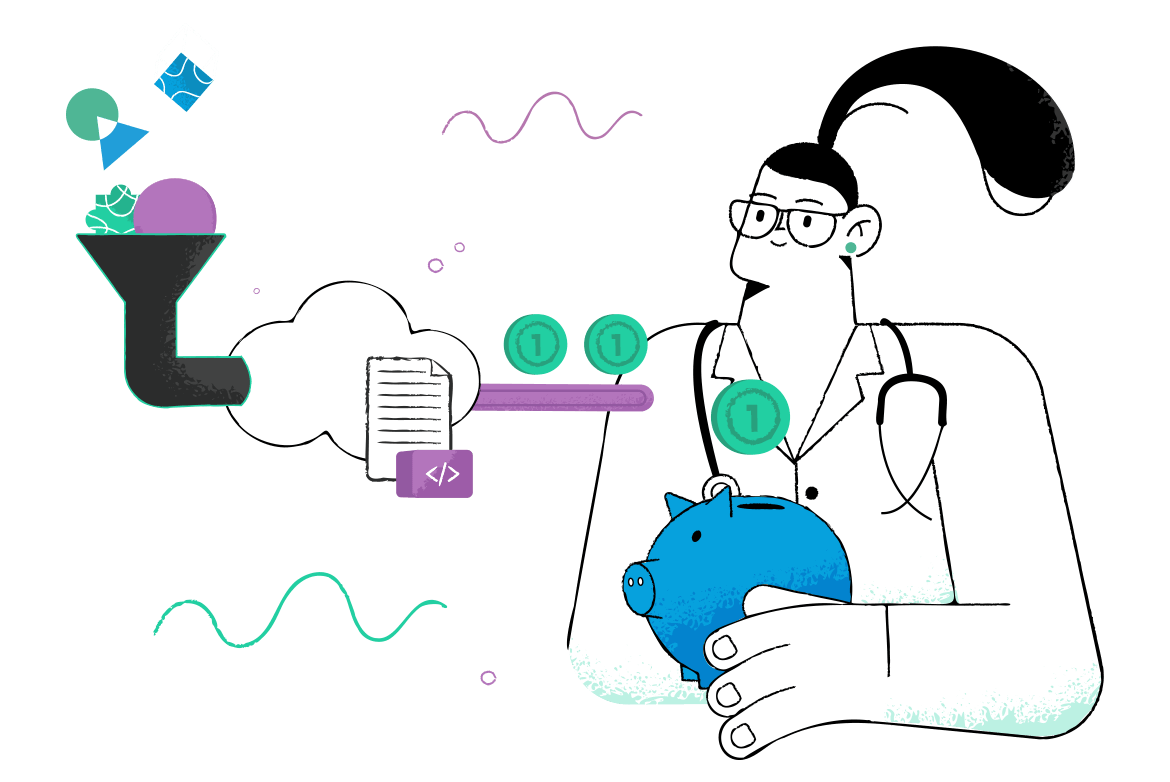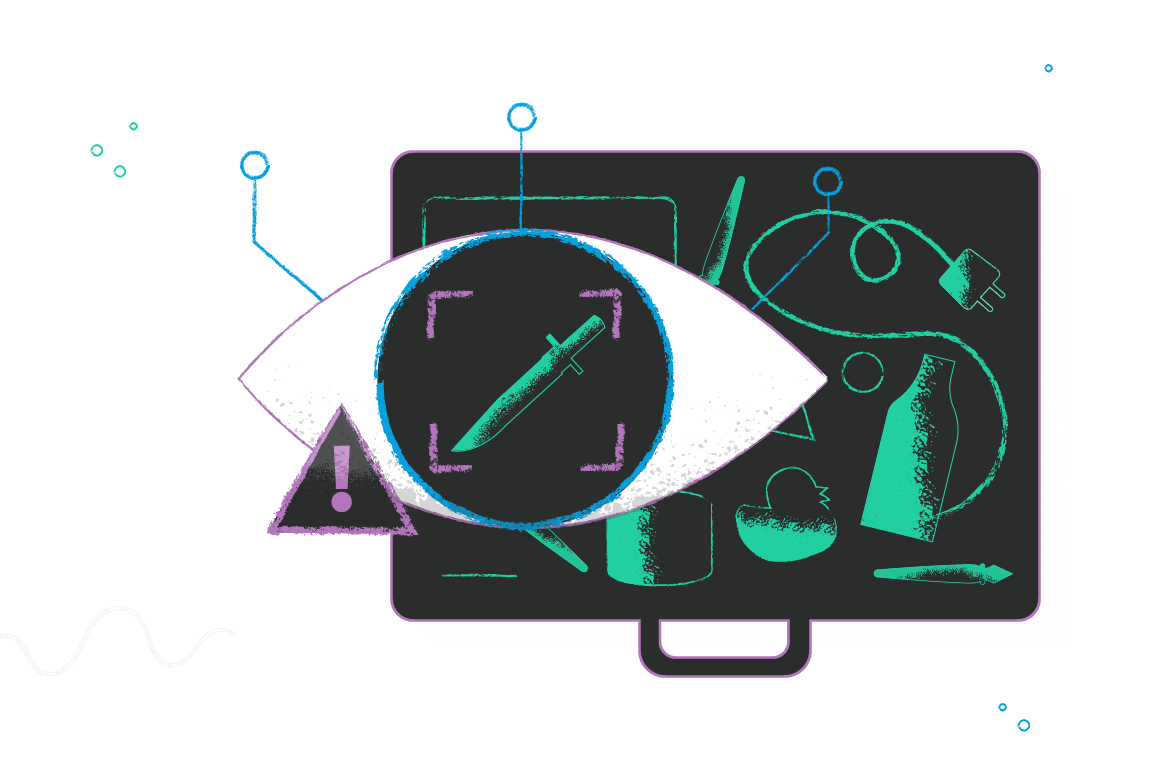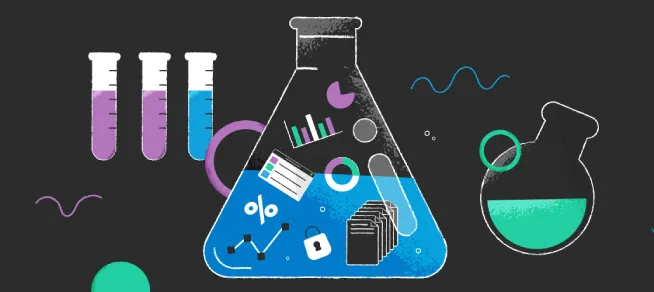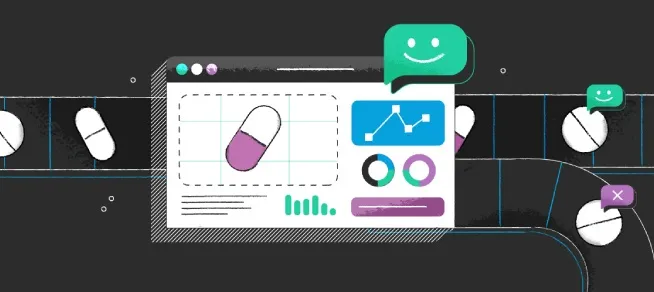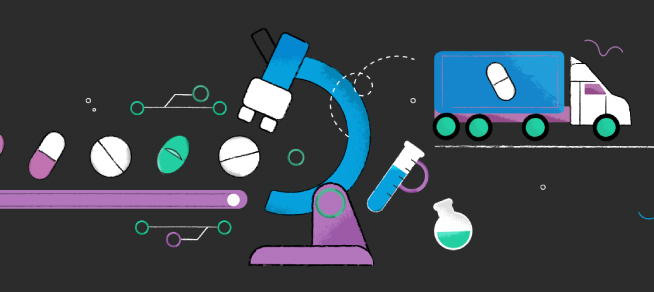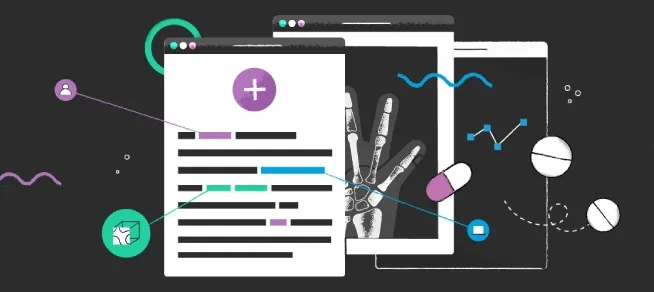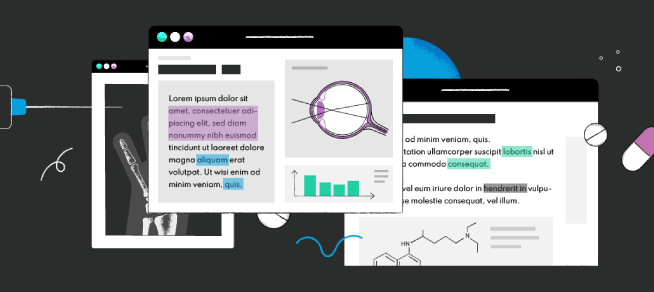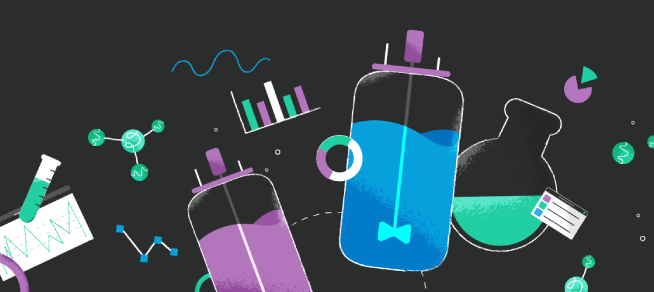


Software Services for the Pharmaceutical Industry
There are a variety of Artificial Intelligence solutions that can be tailored to different industry needs. To make sure you get the most out of your project, our AI Experts will select the best approach for the specific needs of your business and your market. Nexocode provides a range of services that can help pharmaceutical companies. These include:

Data Analysis and Processing - Nexocode's team of Data Scientists can extract meaningful insights from a vast array of sources, such as text documents or social media posts, which are then organized into insights that answer critical business questions.

Predictive Analytics - Our AI Experts will help you become proactive and predictive, freeing up time to focus on what matters most. Advanced machine learning algorithms applied to a data set can produce accurate predictions for future events and trends.

Natural Language Processing - We create systems for NLP and NLG to convert a text into actionable insights. These applications can be used to extract a meaningful summary from a large amount of content or find the most relevant information in a set.

Image Analysis and Recognition - Our solutions can extract insights from various images, including those from the production line. You may want to use computer vision solutions for quality assurance or manufacturing processes.

Predictive Maintenance - Nexocode's AI and machine learning solutions will be able to predict and identify a machine that needs maintenance before it goes down. That way, service works can be scheduled accordingly.

AI Virtual Agents - We offer a range of services from chatbots to virtual agents that can work 24/7. We're excited about the potential for AI-driven communication for sales or support to improve overall customer satisfaction.
Do you want to talk
about your idea?

Our Case Studies
We help pharmaceutical companies create value and ROI by leveraging artificial intelligence and advanced analytics to unlock sustainable growth and operational excellence. We have a team specialized in developing AI applications for the pharmaceutical industry. Check our portfolio of successful implementations below.
Artificial Intelligence in Pharmaceutical Industry
Technology impacts every aspect of our lives and plays a strategic role in the pharmaceutical and life sciences industries. Digital transformation and AI adoption allow pharmaceutical companies to innovate and reach new heights in the industry. These solutions are powerful enough to help pharmaceutical manufacturers better understand patient needs, produce high-quality medications that treat diseases faster, and meet global regulatory standards.
A pharmaceutical company has a lot of data to analyze, from patent databases and clinical trials to manufacturing process data and supply chain information. To make sense of this large amount of data, it is necessary to use advanced methods such as neural networks with artificial intelligence (AI) integration in pharma to find hidden patterns. There are many opportunities for pharmaceutical companies to leverage AI and machine learning across the entire drug development lifecycles. Below you can find a brief introduction to AI applications for the pharmaceutical industry.
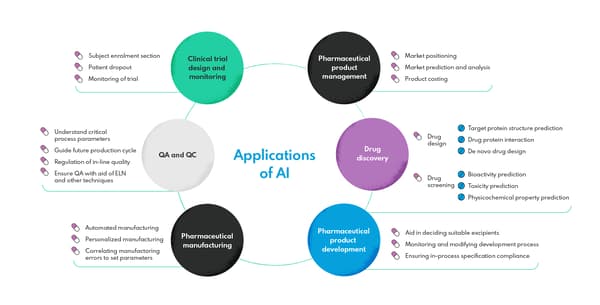 l
l
Artificial intelligence (AI) applications in various subfields of the pharmaceutical industry, ranging from drug development to pharmaceutical product management.
Drug Discovery and Development
Drug discovery and development is a long, expensive process. Pharmaceutical companies are increasingly using AI-powered solutions to streamline the drug discovery pipeline by automating repetitive tasks such as screening for molecular targets of interest in known active compounds or prioritizing molecules that can be developed faster than others with the help of artificial intelligence algorithms. AI has helped pharma companies by enabling them to perform virtual screening of many potential molecules that could lead to a breakthrough therapy for a particular disease. The use of artificial intelligence helps speed up the process of identifying possible targets within a molecule’s chemical structure and finding alternatives based on molecular similarities with compounds already known to work against certain diseases.
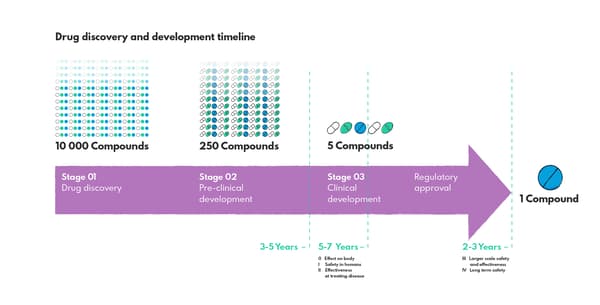
Drug discovery and development timeline with success rates for drugs to enter following drug development phases
What does it mean for patients? Machine Learning algorithms aid in the faster identification of appropriate treatments. The use of AI applications can help to streamline identifying a potential cure, reducing the time from research and development to eventual approval on a global scale.
AI-powered drug discovery solutions have several advantages over traditional approaches, including the ability to explore much larger chemical space and quickly rank compounds for their potential. The technology can also identify new targets in previously unexplored areas. It holds a grand promise for topics like personalized pharmaceuticals or precision medicine. Artificial Intelligence has access to more information than a clinician does when assessing a patient population, such as where the diseases come from geographically or what lifestyle factors contribute to them. Artificial Intelligence also allows clinicians more flexibility in making decisions on how to create personalized pharmaceuticals that are tailored to a specific patient’s needs based on their genome or other data points.
Clinical Trials
Clinical Trials are a crucial path a drug takes before a pharmaceutical company can claim that the drug is both safe and effective. Clinical Trials are typically conducted in phases, with FDA approval required for each stage of a Trial before it proceeds to the next level.
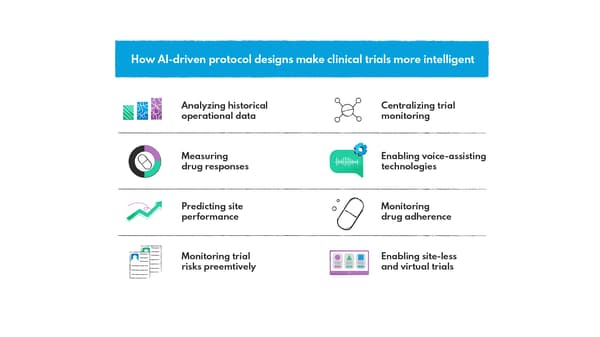
Where AI can be applied in clinical trials?
Clinical trials and the drug development process are connected to a massive amount of information, which needs to be sifted through for insights, such as identifying patterns across groups or looking at efficacy by delivery method. This complexity creates a need for better data management that enables finding pertinent insights from a vast amount of information.
AI could be used in trials by using machine learning algorithms to analyze disparate data sets such as quality assurance checks or patient records from different clinical trial programs over time. By discovering patterns within these datasets, companies might gain insights into a previously unknown problem that was not otherwise obvious through human review alone. These discoveries may very well lead to more efficacious drugs for patients.
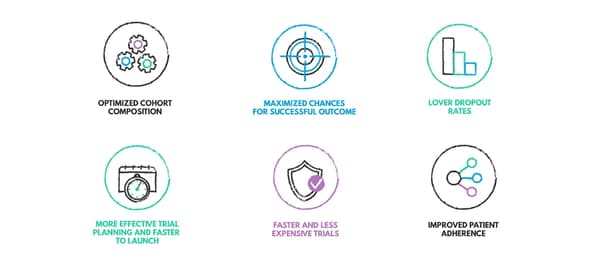
Benefits of AI in clinical trials
It gets more complicated, too, because drugs interact with different people differently depending on various factors such as weight, preexisting conditions, or a person’s age. In a perfect world, you would be able to say with certainty which medication is best for a particular patient, but the truth is we can only make educated guesses. This has led some people to suggest that AI could help improve decision-making and reduce costs by cutting down on trial and error of different medications in a clinical setting.
Pharmaceutical Manufacturing
The process of drug manufacturing is complex, and it falls under strict regulations. Producing drugs and active pharmaceutical ingredients APIs according to a specific formula requires a lot of manual work and a good understanding of the manufacturing process. Artificial Intelligence could be implemented into the drug manufacturing process by automating many time-consuming tasks in this industry, such as packaging or quality control.
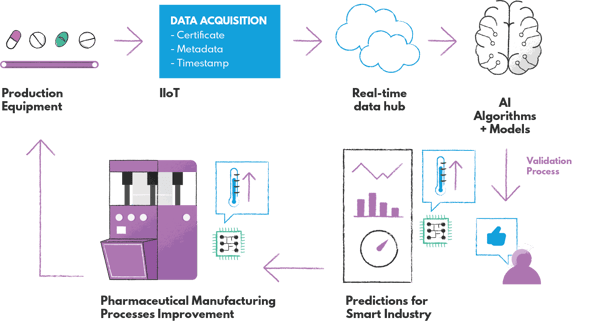
Pharmaceutical manufacturing processes improvement based on Industry Internet of Things solutions (IIoT) and AI algorithms
AI can reduce costs and improve production efficiency for drugs and APIs made at different processing scales. As a result, it would allow pharmaceutical companies to deliver more doses per year while using fewer resources than traditionally required. Such innovative solutions are already being used by prominent pharma players, who use artificial intelligence systems for automated data management across their production and supply chain networks.
Certain types of active agents need expensive equipment that a small pharmaceutical company might not have. AI can be a solution for those companies to reduce the upfront investment on equipment and infrastructure related to manufacturing these types of drugs, thus enabling a new player in this industry segment to enter a market with an innovative product at a lower cost point.
Quality Assurance
The safety and quality of produced pharmaceuticals are crucial for every company working along the pharma value chain. Executing quality at the production line level with AI technologies can introduce an innovative quality assurance (QA) system that can help a company maintain its reputation, promote a high level of customer satisfaction and reduce the number of recalls.
Automated testing is a critical part of any QA process because it helps identify issues with software early enough before release or market launch. AI allows for automatic functional verification as well as regression tests that are more efficient than manual methods. AI may also be leveraged during development and product design stages by detecting flaws at an earlier stage when they are cheaper to correct, which means less need for costly re-testing later on down the line.
AI could also help detect potential quality issues or problems during production that human workers would miss due to limited physical capabilities, such as inspecting large batches of powders using microscopes or checking high-resolution images by eye.
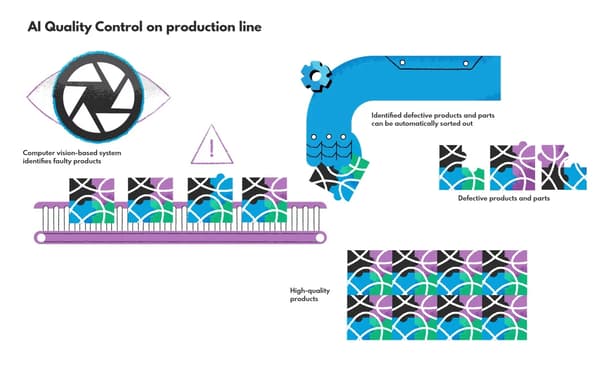
AI-based computer-vision quality control on the production line
This way, AI helps pharmaceutical companies create a safer environment for their employees and customers while improving overall business efficiency through analytics tools based on data collected from industrial sensors and AI software that brings a new competitive edge to the subject.
Pharmaceutical Data Management
The Pharma industry is a big business, and many of the top players in this space are looking to implement AI into their workflow for various reasons. The primary reason that many pharma companies want an AI system is because it allows them to process a large amount of data much faster than a human could do on its own. Thanks to AI solutions, they can identify trends across the data more accurately, get insights from the patterns found within datasets and use those findings as a guide for future product development, manufacturing planning, or marketing strategies.
AI technology can also be leveraged to automate tasks to have more time for other crucial projects. For instance, AI systems provide a way to collect and organize data on side-effects automatically, which means an employee no longer has to spend hours looking through reports.
Pharmacovigilance
Like many other pharma sectors, the field of pharmacovigilance is dealing with ever-increasing volumes of data. Artificial intelligence can benefit from the collection, evaluation, and reporting of adverse events, known as single case processing and continuous monitoring of adverse events and drug reactions.
In a pharmacovigilance environment, it is crucial to monitor the safety of a drug or a medical device. A pharma company can use artificial intelligence to collect and analyze data on adverse events during clinical trials or post-marketing phase by mining databases for reports from around the world in real-time. Artificial intelligence can also be used to autogenerate input for safety reports manually prepared by PV experts.
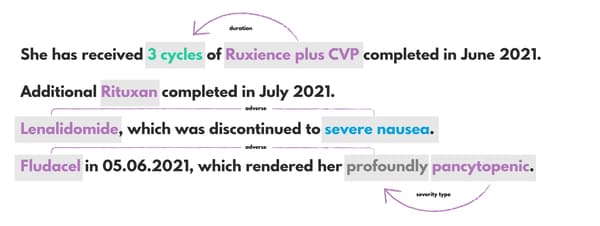
Example of entity extraction and disambiguation and relation extraction outcomes for pharmacovigilance
AI can streamline the process by automating a lot of data gathering and management tasks. AI enables companies to better predict side effects down the road, which will lead to safer drugs than ever before. It allows a drug company to quickly respond if there is an issue with a new product or even clinical trials that need more attention. And finally, it increases accuracy when processing adverse events reports for a pharmaceutical agency.
Pharma Supply Chain
Pharma supply chains have a lot of moving pieces. They are long and complex, with various partners involved at every step along the way from manufacture to patient consumption. AI can identify patterns in these systems that managers would otherwise not know about or see a need for analyzing. AI has been shown to provide insights into how products could be distributed more efficiently, which could save money on inventory costs down the line and help companies find new ways to work together and improve their overall efficiency by eliminating redundancies within those processes themselves.
To keep inventories low, companies need real-time visibility into their stock levels at any given point, so they know when to purchase more products or restock items. AI can also help with this by providing a live stream of data on a company’s inventory levels and predicting when a particular product will be out of stock based on the historical demand for that item.
Drug Distribution
The pharmaceutical distribution process is becoming increasingly complex. Obtaining accurate, timely, and complete information on the product’s location provides a significant challenge for pharmaceutical distributors across all regions. Another challenge for drug distribution processes is effectively warehousing and distributing drugs to end hospitals and pharmacies.
Various artificial intelligence applications have been developed over time that provides solutions for pharma distributors. One such solution would be an intelligent assistant capable of smart inventory management with applications for distributors, wholesalers, retailers, and warehouse managers. Machine learning enables improved forecasting on how much inventory should or could exist depending on seasonality trends or other factors and better insights into the best routes for distribution.
Marketing Pharmaceuticals
Marketing a pharmaceutical product differs from a product like a toothbrush. In this case, the marketing of a drug becomes a lot more complex and requires more than an advertisement on TV or in print to get people interested. When a drug company develops a new drug, they have to go through the FDA or equivalent regulatory body for approval and create advertising campaigns to get their customers on board with purchasing the product. The advertisement has to work within regulations set by government agencies and show the benefits of using the medication while simultaneously downplaying side effects not to scare potential buyers away from making a purchase.
Getting people interested in a particular drug can be challenging: it’s hard enough getting them interested in one type of pill when there are hundreds available at any given moment. This is a huge task, and many people in the pharmaceutical industry rely on AI to do most of their marketing for them.
AI can analyze social media posts about a drug or particular medication to determine who might be interested in it based on the language used (like #cancer), location (#NYC), etc., then target those individuals with advertisements explicitly tailored to what they’re looking for.
Pharmaceutical Sales
Once a pharmaceutical company has their drug approved by the FDA, they have to do several things to get it out there and in front of people. As mentioned before, companies must create advertisements that are targeted towards a specific demographic with information about what makes a product unique or beneficial while at the same time not providing enough information on adverse side effects so as not to scare off potential buyers. Companies also need a marketing strategy for targeting doctors who prescribe medications: this may include sending sales representatives (or “detailers”) into doctor’s offices to provide them free samples of medicines and/or incentives.
The work of drug reps can also be augmented with artificial intelligence. AI can be a valuable tool in identifying doctors who prescribe a specific drug and then provide these specifics to a rep. AI also can collect more data on a doctor’s prescribing habits, which could then be used by a company towards designing personalized marketing campaigns for that individual physician.
Designing new forms or brands of products that are already on the market is a task that can also benefit from using AI. AI helps build analytics systems that track people’s responses to a given medicine, which can then be used to design new formulations or doses. Sales forecasting with artificial intelligence is a great tool that allows drug manufacturers to project popular drugs based on customer purchasing patterns.
Regulatory Compliance and Reporting Systems
AI solutions help build resilience when it comes to ever-changing regulatory compliance. There are several ways AI is being used in the pharma industry to help companies meet regulatory compliance, such as a virtual data room and tools for documenting internal financial reporting.

How AI can extract data from any document with intelligent document processing
Artificial intelligence and deep learning can ensure regulatory compliance through increased safety regarding the handling of confidential information, mitigation of risks, access control, improved data accuracy, instant response to new regulatory requirements, auto-filling, and cross-checking information. All these factors lead to better decision-making, mitigated risks, reduced costs, and improved product liquidity.
Benefits of AI in Pharma
AI provides a range of benefits for the pharmaceutical industry, including:
- Improved patient care by having more accurate data and predictive models.
- Increased efficiency with better forecasting and regulatory compliance management capabilities.
- Faster drug development cycles with increased data processing, analysis, and hypothesis generation for clinical trials.
- Mitigate risk and ensure product safety by analyzing various data types such as clinical trials, adverse events, and patient-reported outcomes (PRO).
- Increase efficiency through automation processes that would otherwise be manual or require a significant amount of time for a human to complete.
- Artificial intelligence has been shown to enhance the identification of adverse events that might have otherwise gone undetected.
- It promises a more accurate future with better predictive models and improved forecasting capabilities.
- Picking up on trends in pharma sales data, ai can predict a company's growth and identify investment opportunities. Improved predictive models help forecast sales records so that investments are made without risk.
- Improve medication adherence by understanding patient needs better through a more personalized experience. Automated data analysis helps alleviate safety risks for pharmaceutical companies and consumers alike.
- Predicting trends in the industry enables pharmacies to react faster to changes in demand for certain drugs, meaning they don't have to overstock products if they think it might not be a popular drug later down the line. The result is the less wasted product as well as increased profits.
How Can Nexocode Experts Help?
nexocode is an artificial intelligence development company with a track record of successful end-to-end implementations. Our work leverages years of academic and industrial experience. We provide innovative solutions to help our customers improve their business and increase profits. Our domain expertise helps us craft more efficient, innovative, and modern experiences and operations for pharma R&D companies, drug manufacturers, distributors, clinicians, and patients.

Dariusz Jacoszek
Life Sciences Expert & Advisor

Dorota Owczarek
Design Thinking Facilitator & Product Lead

Oleksandr Zakharchuk
Machine Learning Expert & Advisor

What Nexocode Can Offer as a Boutique AI Development Company?
Bring AI solutions to life. Nexocode team serves clients at every level of AI maturity. Nexocode offering covers end-to-end artificial intelligence services from AI strategy, advisory, and consulting to implementation and ongoing production support.

AI Design Sprint
Identify AI opportunities and use them to build resilience and business results. We organize AI Design Sprint workshops where you can unleash the artificial intelligence potential and create new value for your business. We will show you how to benefit from artificial intelligence by focusing on people. AI Design Sprint is a low-investment kickstart that will uncover solutions to increase revenues and profits, improve user experience, and much more in just two days.

Proof of Concept Development
Move from the AI Design Sprint towards your first deployment. Nexocode will develop a competitive AI-based solution that solves your company's problem, covers your business needs, and collects and analyzes feedback from testers. Proof of Concept guarantees a much smaller risk of failure, as it only takes a couple of weeks to develop. Still, you can quickly observe what AI brings and decide whether the achieved results look promising enough to follow up with further investment so that you can define your next key goal.
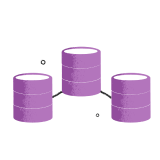
Data Quality Audit
Data represents a new frontier for competitive differentiation. Nexocode offers professional data analysis for your model proposal. We will suggest a data collection strategy to make your model more accurate and provide value to your company. With your data house in order and a transparent process for data management, you will be able to shape your data into an actual business asset.
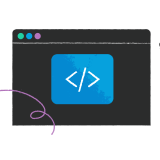
Building Data Systems
Unlock the value of data with a clear data strategy, process, and technology that supports it. Nexocode will keep you in applying professional MLOps handling Big Data. Practices we use will help guarantee that you can reliably build and operate your artificial intelligence solution at scale.
Custom AI Software Development
You can rely on nexocode's AI team, composed of data scientists, ML experts, MLOps professionals, software engineers, and UI/UX designers. Our project managers, experienced with AI, will lead the end-to-end solution implementation in an agile way.
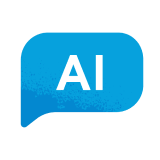
AI Consulting
With vast expertise in implementing AI solutions, the team at nexocode reviews your problem and provides consultations on approaching further steps to complete your business goal and making an impact. We will help you grow beyond the proof of concept stage and implement AI at scale.
A development process that brings AI results in weeks, not years
Kickoff
Briefing
2 hours
Explain your business and share your pain points to gain insights into AI capabilities and an approach designed by our nexocode experts.
AI Design
Sprint
2 days
Identify a high-impact business problem and collaborate with nexocode experts to propose an AI solution.
Proof of AI
Development
4 – 12 weeks
Rapidly build an AI model that solves your problem and subsequently test machine learning algorithms on your datasets.
AI Application Deployment
in Production
3 – 9 months
Build automated pipelines, scale, and deploy your artificial intelligence app into production. Adjust algorithms to meet your desired benchmarks.
